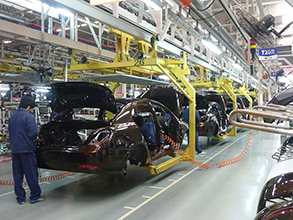
Will China Autos Trigger Next Economic Downturn?
By F. William Engdahl
16 June 2019
Image Author: Siyuwj License: Creative Commons with some restrictions https://bit.ly/2IOskSe
Sales of new cars in China, today the world’s largest automobile market, plunged a dramatic 16.4% in May, making the worst month in the history of the relatively new China auto industry. According to the China Association of Automobile Manufacturers (CAAM), the disastrous May sales came after declines of 14.6% in April and 5.2% in March. It is questionable if this can be blamed on the US-China trade war. The depression in China vehicle sales, however, is having a significant impact on foreign automakers, especially in Germany. Could this China turn presage a major new global economic recession or worse ?
One indication that the US trade war is not the main cause is the fact that May 2019 marks the 12th consecutive month of auto sales decline in China. Sales between automakers in China and car dealers were down 44%. Moreover, domestic sales of Chinese brand autos in May were down a significant 26%. Baojun, Dongfeng and Trumpchi are Chinese brands that have fallen 40% so far this year. Only Japanese Honda and Toyota could show sales increases. Clearly something major and not good is afoot in China, the world’s second largest economy.
A clue to what is driving (pun intended) the drop was given by Xu Haidong, CAAM’s assistant secretary general. He said, “a decline in purchasing power in the low-to-middle income groups as well as expectations of government stimulus to encourage purchases” was a major cause.
Consumer debt
What the “decline in purchasing power in the low-to-middle income groups” means is the worrisome point. As I noted in an earlier piece, the years of Chinese prosperity, much like in the West, have been driven by easy credit, especially since the global financial crisis in 2008.
In 2009 China became the country producing the largest numbers of autos in the world. Many are US or Japanese or EU brands with Chinese production factories. Its car output since a decade has exceeded that of the USA and Japan combined, as well as that of the entire EU. By 2010 China was producing almost 14 million vehicles annually, largest of any nation in history and most of it for its “low-to-middle income” domestic market. China’s middle income earners saw car ownership as essential, and banks and soon non-banks or shadow banks were eager to lend. In 2009 total registration of cars, vans and trucks in China was registered cars, buses, vans, and trucks on the road in China reached 62 million. It will exceed 200 million by 2020. That means that the market for car ownership is, if not saturated, at least up against limits of household debt capacity.
For the past decade Chinese younger families with rising incomes and a car, turned to buy their own apartments or homes for the first time in a major way. By 2018 the explosion of household and other debt, much of it unregulated, began to cause alarm in Beijing and with the Peoples’ Bank of China. It is estimated that an alarming $15 trillion in off-balance-sheet or shadow banking loans were outstanding. At least $3.8 trillion of that was in the form of so-called trust funds that drew savings from ordinary Chinese citizens to invest in local government projects or in housing construction. The World Bank estimated that all China shadow banking had grown from 7% of GDP in 2005 to 31% in 2016. The Basle BIS calculates that some $7 trillion of that is at risk of default.
The current consumer boom was triggered after the 2008 global financial crisis, when the Beijing government made what many saw as a near-panic infusion of cheap money into the economy in a bid to keep employment and incomes rising. As regulators began to try to bring the problem under better control, millions of middle-income Chinese families have suddenly found the economic paradise that seemed to exist the past two decades suddenly was becoming a debtor prison, as property values ceased double-digit rising. One difficulty is getting accurate government economic data. Contrary to the official 6+% GDP growth that seems unshakeable, some Chinese economists have suggested it could well be around 1% or even negative.
In this situation, the recent decline in the Chinese car sales is more than alarming. It has global implications, not least in Germany. Germany’s VW which has production in China is the largest selling car in China with over 3 million in 2017.
Global Impact
In recent months, in large part as a result of the continuing decline in China car sales, the global car industry has entered a new crisis phase. That, atop issues such as diesel emission scandals, is not good news for the industry. Germany’s Center for Automotive Research estimates that global car production in 2019 will fall at least 4 million units, a huge shock. Most Western analysts did not expect the severe drop in China car sales to occur.
In May German Daimler CEO Dieter Zetsche said that “sweeping cost reductions” are ahead to prepare for what he is calling “unprecedented” industry disruption. German auto parts suppliers such as Bosch and thousands of small-to-midsize supplier companies speak of their worst crisis since the oil shocks of the 1970s. Over the first six months of 2019 carmakers worldwide from Germany to Italy to USA and China have cut some 38,000 jobs in response to the global downturn. Bank of America Merrill Lynch auto analyst John Murphy stated, “The industry is right now staring down the barrel of what we think is going to be a significant downturn. The pace of decline in China is a real surprise.”
For German carmakers the timing of the China market collapse could not be worse. Just as they are pouring billions into developing future-generation electric vehicles, still believed years away from viability and far more costly than current gasoline or diesel models, they are being hit with draconian and arbitrary EU emission demands and uncertainty.
Were Washington now to impose new tariffs on imports of German and other EU cars, it could get quite nasty on the economic front. The globalization of industrial production since 2000 that has made China workshop of the world now begins to show tectonic cracks in the globalist foundation.
F. William Engdahl is strategic risk consultant and lecturer, he holds a degree in politics from Princeton University and is a best-selling author on oil and geopolitics, exclusively for the online magazine “New Eastern Outlook”
